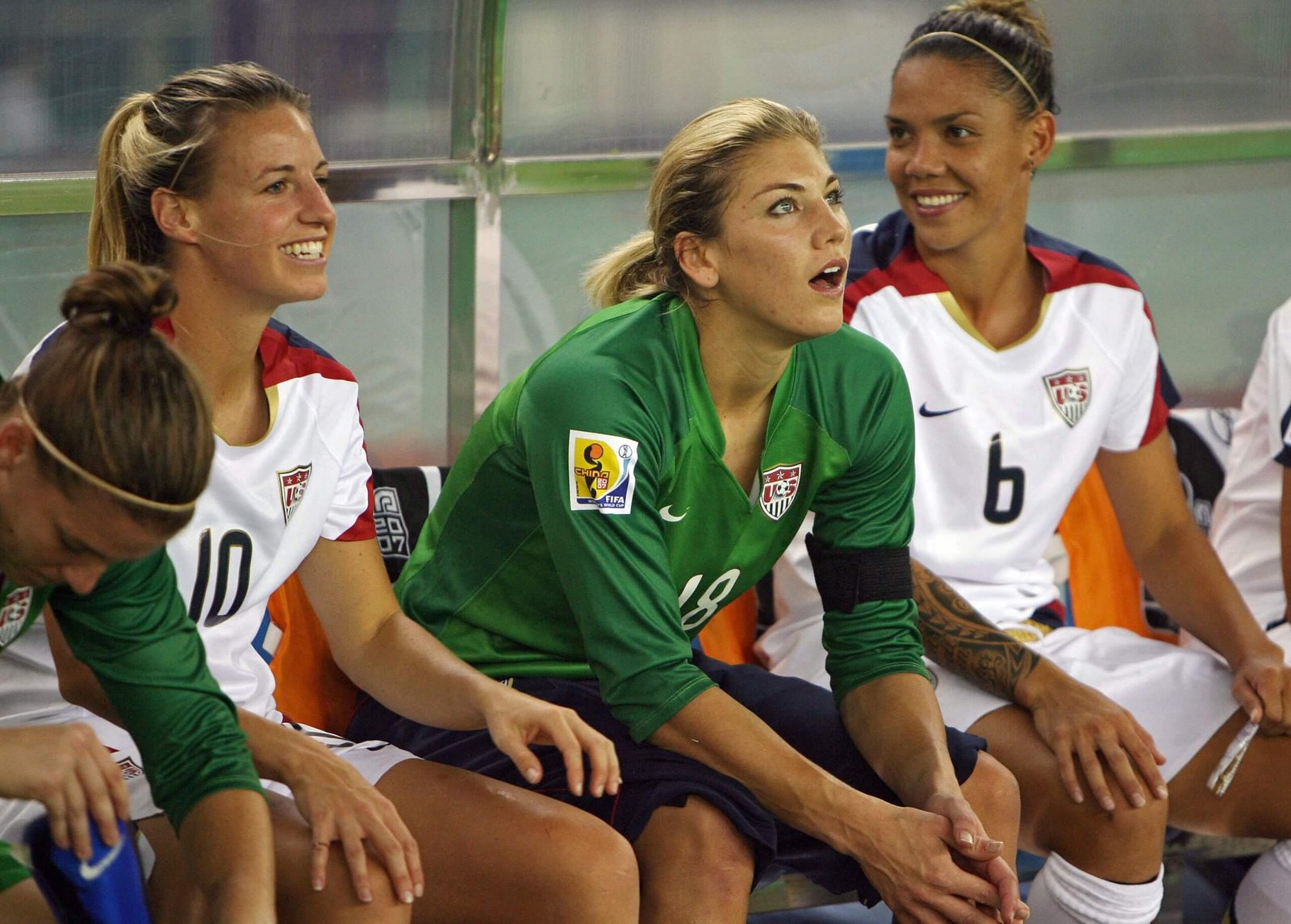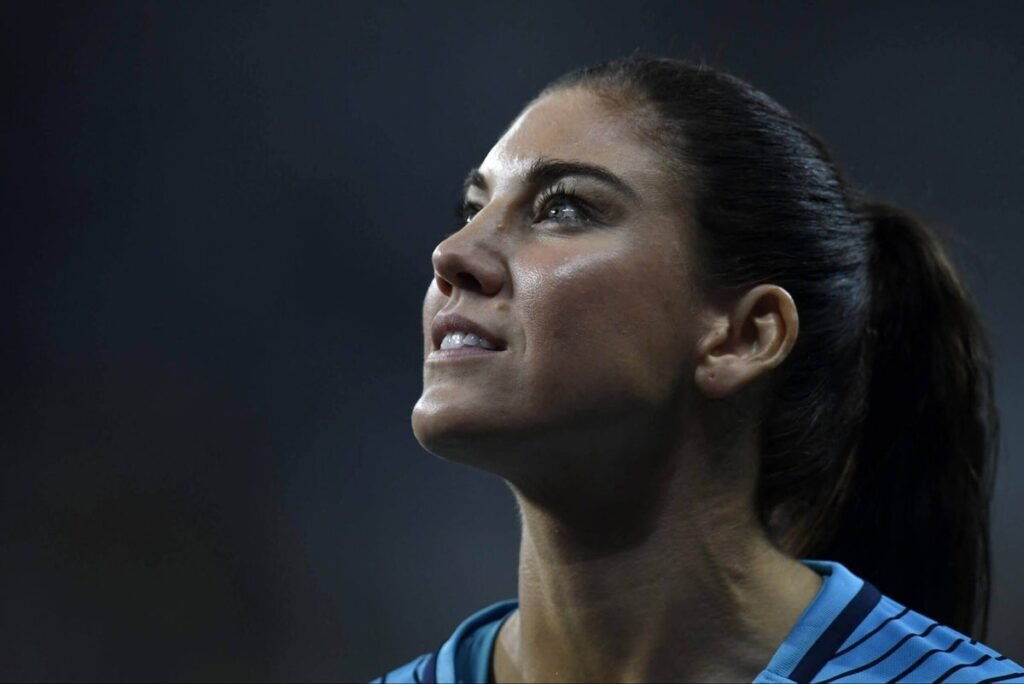How do you tell the story of Hope Solo?
A new episode of Netflix’s “Untold” series tries to answer this question — largely unsuccessfully — featuring extensive interviews with Solo’s childhood best friend and teammate, her college coaches and her lawyer, among others. The premise is presented up front by Solo herself: that she was “blackballed” by U.S. Soccer.
“In 2015, I knew that I found out something that I shouldn’t have found out,” Solo says early in the episode, which is titled “Hope Solo vs. U.S. Soccer.”
“But in that moment, I had no idea that… perhaps I made an enemy. And a year later, I was fired. They said ‘she was a poor sport’ but really, I think it was because I was getting into the money of U.S. Soccer.”
It’s an eye-catching argument, especially for those who are new to Solo’s story or only casually followed the U.S. women’s national team’s fight for equal pay. But while the episode allows Solo to present her case — with support from attorney Rich Nichols, who has written a book on what he views as the failures of the equal-pay fight — it does far too little to test her thesis.
It’s not surprising that the only presence of the other named party in the episode title, U.S. Soccer, is a written statement that comes at the end. What is surprising is how little contemporary evidence is present, with reporting and insight that would either support or disprove Solo’s statements ignored in equal measure.
Hope Solo was inducted into the National Soccer Hall of Fame in 2023 (Carmen Mandato/USSF/Getty Images for USSF)
This isn’t isolated to Solo’s episode. Another episode of this season of “Untold”, “‘Sign Stealer”, which focuses on former University of Michigan football staffer Connor Stalions, has a very similar issue: the central figure’s voice has overtaken any attempt at trying to tell a more complete, nuanced story.
Director Nina Meredith had an uphill climb, though, when it came to doing Solo’s story justice.
Three and a half minutes in, the film addresses how many people refused to participate in it: among them were many former teammates, from 99ers like Mia Hamm and Julie Foudy, to Alex Morgan and Megan Rapinoe, as well as former USWNT head coach Jill Ellis. Even this is presented through Solo’s lens, with her pointing out she has spent years, if not more than a decade, with many of these players.
Before the list of refusals runs, Solo says to the camera: “I think these women are cowardly and controlled by the federation.” No one is there to answer back.
The documentary then rewinds, detailing Solo’s upbringing and her complicated relationship with her father and family, and her entrance into the sport at high school and collegiate level at the University of Washington. This ground was also covered by Solo’s autobiography, released in 2012, but the episode succeeds during this section — an important one because Solo’s early life brings up issues of trauma and class that are crucial to understanding her.
The documentary does lean into two crucial voices, with Solo’s college coaches Lesle Gallimore and Amy Griffin providing some of the nuanced tone a documentary on her requires. They both wish to defend her, and fully understand why many others would not. Most importantly, they can speak on Solo the human and athlete better than anyone else.
“She’s worth fighting for, and that’s not hard,” Griffin states.
“Hope is a polarizing figure,” Gallimore has said on The Athletic’s Full Time podcast. “She just is, and I don’t think that’s up for debate.”
Though for her, there was never any doubt she would continue to support Solo, Gallimore said: “All of those people that they mentioned (declining to be interviewed) had everything to lose and nothing to gain by speaking up.”
The rhetoric around Solo has always been heightened.
I wrote about this in 2015, during the Women’s World Cup, when U.S. Soccer had actually come under considerable pressure for allowing Solo to not just play in that tournament but remain on the team at all following her arrest the previous year for domestic violence following a family argument, leading to two charges that were dismissed in 2018.
Throughout her career, Solo was both in the crosshairs of sexism and being sexualized, considered a villain, for her comments criticising U.S. head coach Greg Byran after he dropped her at the 2007 World Cup, and at the 2016 Olympics (another high note of the doc: Pia Sundhage, former USWNT and then Sweden head coach, shrugging off Solo’s “cowards” comment), as well as someone who never fit the mold of a well-behaved women’s sports star.

Solo was benched for the USWNT’s 2007 World Cup semi-final loss to Brazil (Mark Ralston/AFP via Getty Images)
Maybe there is now a chance to reevaluate the language we used then, in the same ways that we have reconsidered the media coverage of other famous women, such as singer Britney Spears.
That’s not the mission of this “Untold” episode, however. There’s no introspection about how to revisit Solo’s story and tell it anew — just the plug-and-play of her narrative into the standard beats of the format of the “Untold” series. And it does overlook that there has always been support for Solo from the public and some corners of the media; that her voice has not always been silenced, as she feels it has been.
But it’s the coverage of the equal-pay fight where the episode truly falls apart, journalistically.
Solo and Nichols are absolutely entitled to their opinions about how the rest of the U.S. women’s national team may have come up short in achieving pay equality with the men’s national team, or that the settlement reached with U.S. Soccer was a capitulation, but presenting only their thoughts on the deal — while making no mention of the new collective bargaining agreement between U.S. Soccer and the USWNT and USMNT players associations — is malpractice against viewers coming to this with no previous knowledge. Even if no experts were available to be talking heads, there is plenty of archival footage to bring in.
While I do consider the episode to be an exercise in media literacy, there is still value in watching it, as long as it is placed in a larger context and alongside other voices. After viewing it multiple times, my main takeaway remains a deep sadness that Solo feels so isolated — not just from her former teammates and the USWNT itself, but from her own legacy and a sport that was changed by her talent.
“Even watching the Netflix thing and getting all emotional, it’s heartbreaking all over again for me,” Gallimore said on Full Time, “because part of me is like, ‘It didn’t have to be this way’ and the other part of me is like, ‘It was always going to be this way’.
Solo, centre, won the World Cup with the USWNT in 2015 (Doug Murray/Icon Sportswire/Corbis/Icon Sportswire via Getty Images)
“If you know Hope as deeply as Amy and I do, and her best friend Cheryl (Hirss, Solo’s former University of Washington teammate) — Cheryl even more so than the two of us, and we coached both of them — it was probably always going to be this way in some way, shape or form.”
If nothing else, “Untold: Hope Solo vs. U.S. Soccer” opens the door to more conversations about Solo and her legacy, ones that could offer depth and nuance, and wrestle with the tension of how to balance primary sources with absent voices.
“Hope’s (story) in particular, with all the things that have come with her and have gone on with her, an hour and 20 minutes doesn’t scratch the surface,” Gallimore added. “They just don’t.”
There’s two sides to every story. For the first time, Hope Solo tells how her fight for equal pay led to a falling out with the national team. Untold: Hope Solo vs US Soccer, is now streaming only on Netflix pic.twitter.com/NKoy9RZGgg
— Netflix (@netflix) September 4, 2024
(Top photo: AAron Ontiveroz/The Denver Post via Getty Images)
Read the full article here

